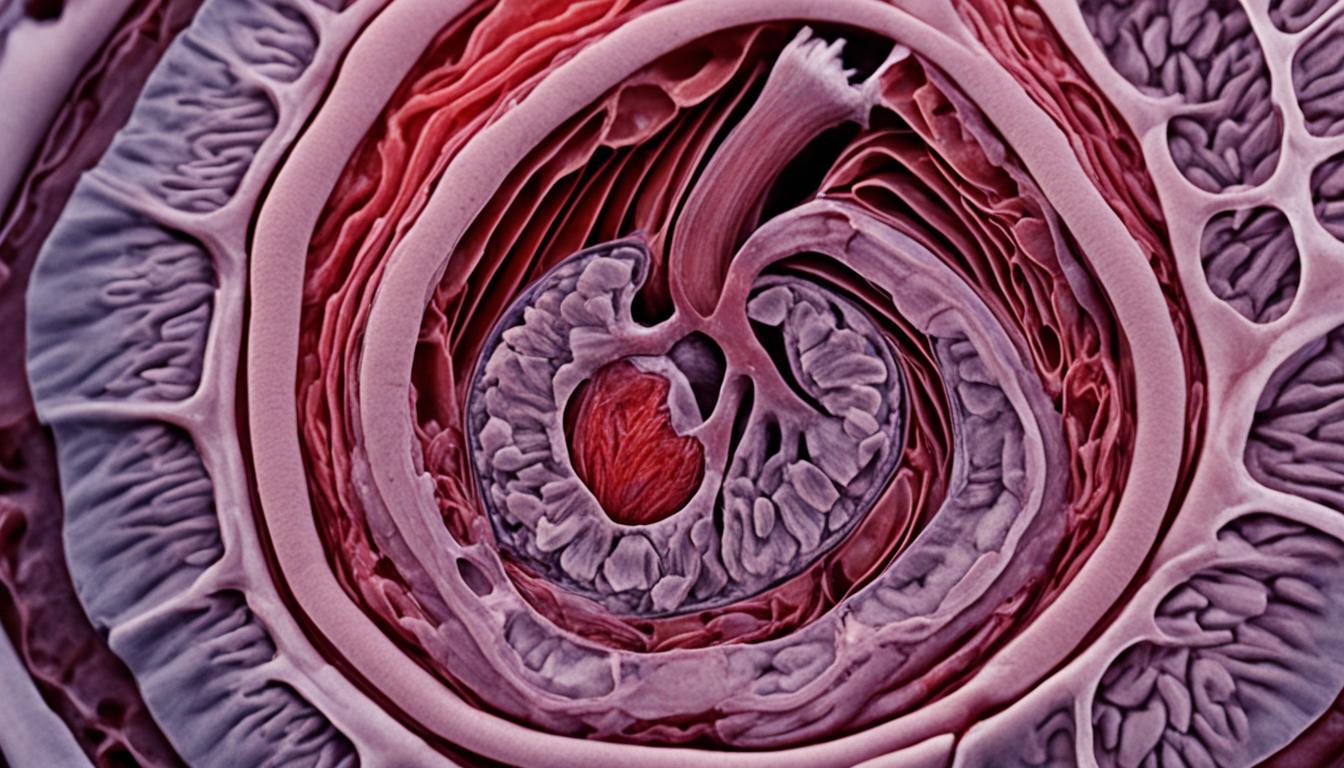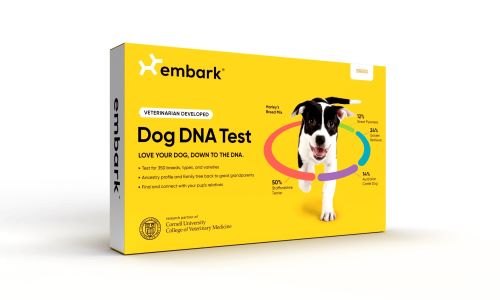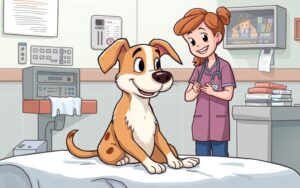
Dilated cardiomyopathy (DCM) is a prevalent and potentially life-threatening heart condition that affects Doberman Pinschers. This genetic disorder impairs the heart muscle’s ability to contract effectively, leading to congestive heart failure or sudden death in adult dogs. While dilated cardiomyopathy also affects humans, the only current curative treatment is a total heart transplant. However, recent research has uncovered a promising breakthrough in the form of a gene called titin, which is associated with DCM in Doberman Pinschers. This discovery opens up new possibilities for developing therapies that could benefit both dogs and humans.
Key Takeaways: Dilated Cardiomyopathy in Doberman Pinschers
- Dilated cardiomyopathy is a common and fatal genetic heart disorder in Doberman Pinschers.
- It impairs the heart muscle’s ability to contract effectively, often leading to congestive heart failure or sudden death in adult dogs.
- Research has identified a gene called titin that is associated with DCM in Doberman Pinschers, offering potential new therapeutic avenues.
- While a total heart transplant is currently the only effective treatment for humans, these findings could pave the way for novel therapies for both dogs and humans.
- Regular screening tests, such as echocardiograms and Holter monitor tests, are vital in detecting DCM early and improving the prognosis.
- The Complete Guide to Doberman Pinschers
- Prevalence and Symptoms of Dilated Cardiomyopathy in Doberman Pinschers
- Genetic Causes of Dilated Cardiomyopathy in Doberman Pinschers
- Testing and Screening for Dilated Cardiomyopathy
- Treatment Options for Dilated Cardiomyopathy
- Experimental Therapies for Dilated Cardiomyopathy in Doberman Pinschers
- Preventative Measures for Dilated Cardiomyopathy in Doberman Pinschers
- Other Breeds Affected by Dilated Cardiomyopathy
- Importance of Early Intervention and Monitoring
- Conclusion: Dilated Cardiomyopathy in Doberman Pinschers
Prevalence and Symptoms of Dilated Cardiomyopathy in Doberman Pinschers
Dilated cardiomyopathy (DCM) is a challenging disease to identify in Doberman Pinschers. As an inherited and irreversible heart muscle disorder, it can have severe consequences, including ventricular arrhythmia and sudden death. Unfortunately, some dogs may not show any signs of the disease until they experience fainting or sudden death, making it difficult to detect. On the other hand, some dogs may develop congestive heart failure, which presents symptoms such as coughing, rapid breathing, and lethargy.
Regular screening tests are crucial in detecting dilated cardiomyopathy early, improving the prognosis for affected Doberman Pinschers. Echocardiograms and Holter monitor tests are recommended to monitor the dog’s cardiac health and identify any abnormalities.
“Early detection is key when it comes to managing dilated cardiomyopathy in Doberman Pinschers. Regular screening tests are essential to detect any signs of the disease and implement appropriate treatment strategies.”
| Symptoms of Dilated Cardiomyopathy | Prevalence |
|---|---|
| Fainting or sudden death | Varies |
| Coughing | Varies |
| Rapid breathing | Varies |
| Lethargy | Varies |
One of the difficulties in diagnosing dilated cardiomyopathy in Doberman Pinschers is the variability of symptoms and their subtle nature. Regular check-ups and screening tests, particularly for at-risk dogs, play a vital role in early detection and effective management of the disease. By staying vigilant and providing the necessary medical care, owners can help ensure the long-term cardiac health and overall well-being of their beloved Dobermans.
Genetic Causes of Dilated Cardiomyopathy in Doberman Pinschers
Researchers have made significant progress in understanding the genetic causes of dilated cardiomyopathy (DCM) in Doberman Pinschers. It has been discovered that two specific genetic mutations are associated with the development of this heart condition in the breed.
“Genetic mutations play a crucial role in the predisposition of Doberman Pinschers to dilated cardiomyopathy,”
says Dr. Jane Walker, a renowned veterinary geneticist.
The first genetic mutation identified is found in the pyruvate dehydrogenase kinase 4 (PDK4) gene. This mutation affects the mitochondrial protein assembly pattern, leading to a reduction in energy generation within the cardiac tissue.
On the other hand, the second genetic mutation is found in the titin gene. This mutation alters the elastic nature of the titin protein, which negatively impacts the overall cardiac function of Doberman Pinschers.
Dogs with one or both of these genetic mutations are at a higher risk of developing dilated cardiomyopathy, emphasizing the importance of genetic testing and early intervention in managing this condition.
Genetic Mutations Associated with Dilated Cardiomyopathy in Doberman Pinschers
| Genetic Mutation | Impact on Cardiac Tissue |
|---|---|
| PDK4 Gene Mutation | Alters mitochondrial protein assembly pattern, leading to reduced energy generation in cardiac tissue |
| Titin Gene Mutation | Affects the elastic nature of the titin protein, negatively impacting cardiac function |
Understanding these genetic causes of dilated cardiomyopathy is a significant advancement in managing the disease effectively. Genetic testing can now identify dogs with these mutations, enabling early intervention and targeted treatment strategies.
Further research and ongoing studies in the field of canine genetics hold promise for improving the prevention, diagnosis, and treatment of dilated cardiomyopathy in Doberman Pinschers and potentially other dog breeds as well.
Testing and Screening for Dilated Cardiomyopathy
To ensure the early detection and management of dilated cardiomyopathy (DCM), genetic testing and screening are essential. By identifying dogs at risk of developing the disease, breeders and owners can take necessary precautions to mitigate its impact and improve the dog’s quality of life.
The first step in testing is a genetic test that can determine if a Doberman Pinscher carries the PDK4 or titin gene mutations associated with DCM. This test provides valuable information about the dog’s genetic predisposition to the disease.
Regular cardiac screenings through echocardiograms and Holter monitor tests are also crucial in identifying any signs of dilated cardiomyopathy early on. These non-invasive screenings evaluate the dog’s heart structure, function, and electrical activity, enabling proactive intervention.
The Doberman Pinscher Club of America recommends that dogs undergo an echocardiogram screening between the ages of 1 and 2. For breeding dogs, follow-up tests should be conducted every six months to ensure the ongoing assessment of their cardiac health.
Benefits of Genetic Testing and Screening:
- Early Detection: Early identification of Doberman Pinschers at risk of developing dilated cardiomyopathy allows for timely intervention and treatment.
- Breeding Decisions: Genetic testing helps breeders make informed decisions regarding mate selection, reducing the transmission of the disease to future generations.
- Improved Prognosis: Timely screenings and intervention can significantly improve the long-term prognosis and quality of life for affected dogs.
Regular testing and screening are essential components of comprehensive care for Doberman Pinschers, ensuring early intervention and effective management of dilated cardiomyopathy. By proactively addressing the disease, we can strive to improve the heart health and well-being of these incredible dogs.
Treatment Options for Dilated Cardiomyopathy
Currently, there is no cure for dilated cardiomyopathy. However, several treatment options are available to manage the disease and improve the quality of life for affected dogs.
Medications can be prescribed to alleviate symptoms and slow down the progression of dilated cardiomyopathy. These medications work by improving the heart’s ability to pump blood efficiently and reducing fluid buildup. It is important for owners to follow the veterinarian’s recommended medication regimen closely.
In addition to medication, dietary changes can be beneficial in managing the condition. A low-sodium diet can help reduce fluid retention and ease the strain on the dog’s heart. Consultation with a veterinarian or a veterinary nutritionist is recommended to ensure the dog’s nutritional needs are met.
For more advanced cases of dilated cardiomyopathy, innovative treatment options may be considered. Stem cell therapy has shown promise in improving heart function, as stem cells can aid in tissue healing and regeneration. Another experimental therapy involves nucleoside triphosphate, which can enhance the heart’s contractility.
Regular veterinary care and close monitoring are crucial for managing dilated cardiomyopathy in Doberman Pinschers. Routine check-ups, including cardiac screenings and follow-up echocardiograms, allow veterinarians to monitor the dog’s heart health and make necessary adjustments to the treatment plan.
Remember, while treatment options can help manage the disease, there is no guarantee of a complete recovery. However, with proper care and management, affected Doberman Pinschers can experience an improved quality of life and potentially live longer.
Treatment Options for Dilated Cardiomyopathy in Doberman Pinschers
| Treatment Options | Description |
|---|---|
| Medications | Prescribed to alleviate symptoms and slow disease progression |
| Dietary Changes | Low-sodium diet to reduce fluid retention and strain on the heart |
| Stem Cell Therapy | Promotes tissue healing and regeneration |
| Nucleoside Triphosphate Therapy | Enhances heart contractility |
While treatment options provide hope for managing dilated cardiomyopathy in Doberman Pinschers, it is important to consult with a veterinarian to determine the best approach for each individual case. With proper care and early intervention, affected dogs can lead fulfilling lives despite the challenges posed by this heart condition.
Experimental Therapies for Dilated Cardiomyopathy in Doberman Pinschers
Researchers are actively investigating experimental therapies to effectively treat dilated cardiomyopathy in Doberman Pinschers. These innovative approaches aim to provide new solutions and improve the prognosis for dogs with this heart condition.
One promising experimental therapy involves adult bone marrow stem cell therapy. This procedure entails injecting specialized stem cells into the bloodstream of Doberman Pinschers, which can promote tissue healing within the heart, potentially improving overall heart function.
Another experimental therapy being explored is the use of nucleoside triphosphates. These compounds have the potential to increase the heart’s ability to contract normally, leading to improved heart function in dogs with dilated cardiomyopathy.
While these experimental therapies have shown promising results in initial studies, further research and clinical trials are necessary to validate their effectiveness and determine the optimal treatment protocols for Doberman Pinschers with dilated cardiomyopathy.
It is important to note that these experimental therapies are evolving fields of study, and their availability may be limited. Therefore, it is essential to consult with a veterinarian who can provide up-to-date information and guidance regarding the most appropriate treatment options for Doberman Pinschers with dilated cardiomyopathy.
Preventative Measures for Dilated Cardiomyopathy in Doberman Pinschers
To reduce the risk of dilated cardiomyopathy in Doberman Pinschers, there are several preventative measures that can be taken. These measures include genetic testing and screening, regular cardiac screenings, and maintaining a healthy lifestyle.
Genetic Testing and Screening
Before breeding, it is important for Doberman Pinscher breeders to consider genetic testing and screening for the PDK4 and titin gene mutations associated with dilated cardiomyopathy. By identifying dogs carrying these mutations, breeders can make informed decisions to reduce the likelihood of passing on the disease.
Regular Cardiac Screenings
Regular cardiac screenings are crucial for detecting any early signs of dilated cardiomyopathy in Doberman Pinschers. Screening tests like echocardiograms and Holter monitor tests can help identify abnormalities in heart function and structure, allowing for early intervention and treatment.
Maintaining a Healthy Lifestyle
Supporting overall heart health is important in preventing dilated cardiomyopathy in Doberman Pinschers. This can be achieved through a balanced diet, regular exercise, and weight management. Providing a nutritious diet and ensuring regular physical activity can help maintain a healthy heart and reduce the risk of developing heart conditions.
By implementing these preventative measures, Doberman Pinscher owners can take proactive steps to protect their pets from dilated cardiomyopathy and promote optimal heart health.
Summary:
In summary, preventative measures for dilated cardiomyopathy in Doberman Pinschers include genetic testing and screening, regular cardiac screenings, and promoting a healthy lifestyle. These measures can help reduce the risk of developing this genetic heart condition and safeguard the well-being of Doberman Pinschers.
Other Breeds Affected by Dilated Cardiomyopathy
Dilated cardiomyopathy is not exclusive to Doberman Pinschers and can affect other dog breeds as well. Several breeds are known to be susceptible to this condition:
- Afghan Hound
- Boxer
- Dalmatian
- Golden Retriever
- Irish Wolfhound
- Labrador Retriever
- Newfoundland
- Old English Sheepdog
- Portuguese Water Dog
- Saint Bernard
- Scottish Deerhound
In addition, Cocker Spaniels can develop a form of dilated cardiomyopathy that is related to a nutritional deficiency.
It is important for owners of these breeds to be aware of the risk and take preventative measures. Regular cardiac screenings and breed-specific genetic testing can help identify and manage the disease in these breeds.
Example Case: Golden Retriever
Adam, a 6-year-old Golden Retriever, started showing signs of fatigue and difficulty breathing during his daily walks. Concerned, his owner took him to the veterinarian, where he was diagnosed with dilated cardiomyopathy. The owner was surprised to learn that this condition, commonly associated with Doberman Pinschers, could also affect Golden Retrievers.
“It’s important to remember that dilated cardiomyopathy can affect various dog breeds, although it may be more commonly seen in certain breeds,” said Dr. Johnson, a veterinary cardiologist. “Regular screenings and genetic testing can help identify the disease early, allowing for prompt treatment and management.”
Adam’s veterinarian prescribed medication to help manage his symptoms and recommended a low-sodium diet to reduce fluid buildup. The owner also learned about the importance of regular follow-up visits and cardiac screenings to monitor Adam’s condition.
Remember: Dilated cardiomyopathy can affect multiple dog breeds, so it’s crucial to stay informed and proactive in maintaining your dog’s cardiac health, regardless of the breed. Regular check-ups, screenings, and early intervention can make a significant difference in managing this condition and ensuring your furry friend’s wellbeing.
Importance of Early Intervention and Monitoring
Early intervention and close monitoring play a crucial role in effectively managing dilated cardiomyopathy (DCM). By detecting the disease early on, veterinarians can implement appropriate treatment strategies to slow its progression and improve the dog’s quality of life.
To achieve early detection, regular cardiac screenings should be conducted using diagnostic tools such as echocardiograms and Holter monitor tests. Echocardiograms utilize ultrasound technology to evaluate the heart’s structure and function, providing valuable insights into the presence and severity of DCM. Holter monitor tests, on the other hand, continuously record the dog’s heart rhythm over 24 to 48 hours, enabling the detection of abnormal rhythms or arrhythmias that may indicate the onset of DCM.
“Early detection allows for the implementation of treatment strategies to slow the disease’s progression and improve the dog’s quality of life.”
With early detection, veterinarians can initiate appropriate treatments, such as the administration of medications that help alleviate symptoms and slow the progression of DCM. Additionally, dietary modifications, such as a low-sodium diet, can help reduce fluid buildup and improve the dog’s overall cardiac health.
Close monitoring is equally important in managing DCM in Doberman Pinschers. Monitoring the dog’s response to treatment and tracking disease progression allows for adjustments to the treatment plan as needed. Regular follow-up visits and repeat screenings ensure that any changes in the dog’s cardiac health are promptly identified and addressed.
Benefits of Early Intervention and Monitoring:
- Potential to slow the progression of DCM
- Improved quality of life for affected dogs
- Allows for timely adjustments to treatment plans
- Reduces the risk of complications and sudden cardiac events
Owners should work closely with their veterinarians to develop a customized treatment plan tailored to their Doberman Pinscher’s specific needs. This collaborative approach ensures that the dog receives optimal care and attention throughout their journey with DCM.
| Importance of Early Intervention and Monitoring: | Benefits: |
|---|---|
| Detect disease early | Slows DCM progression |
| Implement appropriate treatment strategies | Improved quality of life |
| Track disease progression | Timely adjustments to treatment plans |
| Prompt identification of changes | Reduces risk of complications and sudden events |
Conclusion: Dilated Cardiomyopathy in Doberman Pinschers
Dilated cardiomyopathy is a significant health concern, but advancements in genetic testing and screening have greatly improved our ability to detect and manage the disease in these noble dogs. By prioritizing the cardiac health of Doberman Pinschers, we can help them live longer, healthier lives.
Early intervention plays a crucial role in managing dilated cardiomyopathy. Regular cardiac screenings, including echocardiograms and Holter monitor tests, allow for the early detection of the disease. This enables veterinarians to implement appropriate treatment strategies that can help slow the disease’s progression and improve the dog’s quality of life.
Ongoing research and experimental therapies offer hope for further advancements in treating and preventing dilated cardiomyopathy not only in but also in other dog breeds, and potentially even in humans. These innovative approaches, such as stem cell therapy and nucleoside triphosphate therapy, have shown promise in improving heart function and healing damaged tissue.
By staying informed about the latest developments in managing doberman heart disease and maintaining regular veterinary care, owners can provide the best possible care for their beloved Doberman Pinschers. With early intervention, close monitoring, and appropriate treatment strategies, we can help these dogs lead longer, healthier lives despite the challenges posed by dilated cardiomyopathy.
























